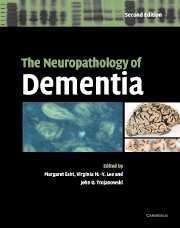Book contents
- Frontmatter
- Contents
- List of contributors
- List of abbreviations
- Preface to second edition
- 1 Definition, clinical features and neuroanatomical basis of dementia
- 2 Important anatomical landmarks in the brain in dementia
- 3 Practical approach to pathological diagnosis
- 4 Morphometric methods and dementia
- 5 Safety precautions in laboratories involved with dementia diagnosis and research
- 6 Molecular diagnosis of dementia
- 7 Neuropathology of the ageing brain
- 8 Neuroimaging Alzheimer's disease
- 9 Alzheimer's disease
- 10 Down's syndrome and Alzheimer's disease
- 11 Sporadic tauopathies: Pick's disease, corticobasal degeneration, progressive supranuclear palsy and argyrophilic grain disease
- 12 Hereditary tauopathies and idiopathic frontotemporal dementias
- 13 Vascular dementias
- 14 Familial and sporadic cerebral amyloid angiopathies associated with dementia and the BRI dementias
- 15 Parkinson's disease, dementia with Lewy bodies, multiple system atrophy and the spectrum of diseases with α-synuclein inclusions
- 16 Huntington's disease
- 17 Human prion diseases
- 18 Alcoholism and dementia
- 19 Hydrocephalus and dementia
- 20 Head injury and dementia
- 21 Infectious (and inflammatory) diseases causing dementia
- 22 Schizophrenia and its dementia
- 23 Other diseases that cause dementia
- 24 Transgenic mouse models of neurodegenerative disease
- Appendix: Dementia brain banks
- Index
14 - Familial and sporadic cerebral amyloid angiopathies associated with dementia and the BRI dementias
Published online by Cambridge University Press: 12 October 2009
- Frontmatter
- Contents
- List of contributors
- List of abbreviations
- Preface to second edition
- 1 Definition, clinical features and neuroanatomical basis of dementia
- 2 Important anatomical landmarks in the brain in dementia
- 3 Practical approach to pathological diagnosis
- 4 Morphometric methods and dementia
- 5 Safety precautions in laboratories involved with dementia diagnosis and research
- 6 Molecular diagnosis of dementia
- 7 Neuropathology of the ageing brain
- 8 Neuroimaging Alzheimer's disease
- 9 Alzheimer's disease
- 10 Down's syndrome and Alzheimer's disease
- 11 Sporadic tauopathies: Pick's disease, corticobasal degeneration, progressive supranuclear palsy and argyrophilic grain disease
- 12 Hereditary tauopathies and idiopathic frontotemporal dementias
- 13 Vascular dementias
- 14 Familial and sporadic cerebral amyloid angiopathies associated with dementia and the BRI dementias
- 15 Parkinson's disease, dementia with Lewy bodies, multiple system atrophy and the spectrum of diseases with α-synuclein inclusions
- 16 Huntington's disease
- 17 Human prion diseases
- 18 Alcoholism and dementia
- 19 Hydrocephalus and dementia
- 20 Head injury and dementia
- 21 Infectious (and inflammatory) diseases causing dementia
- 22 Schizophrenia and its dementia
- 23 Other diseases that cause dementia
- 24 Transgenic mouse models of neurodegenerative disease
- Appendix: Dementia brain banks
- Index
Summary
Introduction
In this chapter we review a number of conditions which have in common cerebral amyloid angiopathy (CAA) (Table 14.1). However, and particularly in the context of dementia, it is now possible to make a clear distinction in this group of diseases. The distinction relates to the pathological processes which primarily lead to dementia.
Both sporadic and familial CAA from any cause can lead to dementia as a consequence of the angiopathy itself. The discussion regarding the causes of dementia in such instances may be closely related to the discussion in arteriosclerotic vascular dementia (Chapter 13). CAA occurring in Alzheimer's disease (AD) may contribute to the dementia by similar mechanisms. The clinico-pathological consequences of the CAA may be in some cases insignificant; in others there may be diffuse white matter rarefaction very similar to hypertensive Binswanger's encephalopathy (Chapter 13); or there may be recurrent haemorrhage. The haemorrhages themselves are usually large and lobar – with characteristic distribution – but occasionally smaller, deep haemorrhages of the type associated with hypertensive lacunar disease may occur. Finally areas of infarction may be seen but this rarely dominates the clinical picture. Lobar cerebral haemorrhage seems to occur particularly in those cases in which fibrinoid necrosis and microaneurysm formation occur – these are the hallmarks of severe amyloid angiopathy (Vonsattel et al., 1991). Ischaemic white matter changes (leukoencephalopathy or leukoariosis) can occur even when the vessels in the affected white matter do not show evidence of angiopathy, the ischaemia presumably being secondary to involvement of the penetrating cortical vessels (Dubas et al., 1985; Vonsattel et al., 1991). Yoshimura et al.
- Type
- Chapter
- Information
- The Neuropathology of Dementia , pp. 330 - 352Publisher: Cambridge University PressPrint publication year: 2004
- 6
- Cited by



